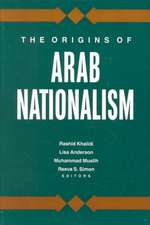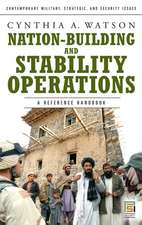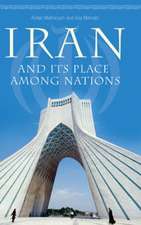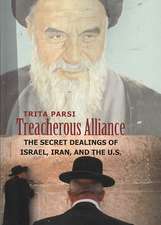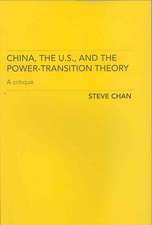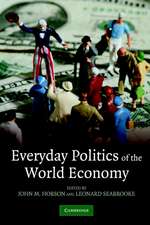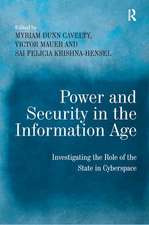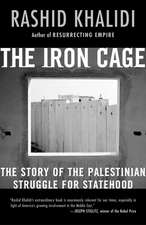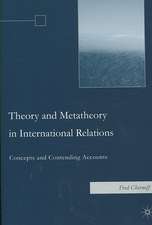Brokers of Deceit: How the US Has Undermined Peace in the Middle East
Autor Rashid Khalidien Limba Engleză Paperback – 10 mar 2014
For more than seven decades the conflict between Israel and the Palestinian people has raged on with no end in sight, and for much of that time, the United States has been involved as a mediator in the conflict. In this book, acclaimed historian Rashid Khalidi zeroes in on the United States’s role as the purported impartial broker in this failed peace process.
Khalidi closely analyzes three historical moments that illuminate how the United States’ involvement has, in fact, thwarted progress toward peace between Israel and Palestine. The first moment he investigates is the “Reagan Plan” of 1982, when Israeli prime minister Menachem Begin refused to accept the Reagan administration’s proposal to reframe the Camp David Accords more impartially. The second moment covers the period after the Madrid Peace Conference, from 1991 to 1993, during which negotiations between Israel and Palestine were brokered by the United States until the signing of the secretly negotiated Oslo accords. Finally, Khalidi takes on President Barack Obama’s retreat from plans to insist on halting the settlements in the West Bank.
Through in-depth research into and keen analysis of these three moments, as well as his own firsthand experience as an advisor to the Palestinian delegation at the 1991 preߝOslo negotiations in Washington, DC, Khalidi reveals how the United States and Israel have actively colluded to prevent a Palestinian state and resolve the situation in Israel’s favor. Brokers of Deceit bares the truth about why peace in the Middle East has been impossible to achieve: for decades, US policymakers have masqueraded as unbiased agents working to bring the two sides together, when, in fact, they have been the agents of continuing injustice, effectively preventing the difficult but essential steps needed to achieve peace in the region.
Preț: 104.35 lei
Nou
Puncte Express: 157
Preț estimativ în valută:
19.97€ • 21.70$ • 16.79£
19.97€ • 21.70$ • 16.79£
Carte disponibilă
Livrare economică 31 martie-14 aprilie
Livrare express 14-20 martie pentru 26.10 lei
Preluare comenzi: 021 569.72.76
Specificații
ISBN-13: 9780807033241
ISBN-10: 0807033243
Pagini: 167
Dimensiuni: 152 x 226 x 18 mm
Greutate: 0.32 kg
Editura: Beacon Press (MA)
ISBN-10: 0807033243
Pagini: 167
Dimensiuni: 152 x 226 x 18 mm
Greutate: 0.32 kg
Editura: Beacon Press (MA)
Recenzii
Praise for Brokers of Deceit
"What has happened to the Palestinian people since 1948 is one of the great crimes of modern history. Of course, Israel bears primary responsibility for this tragedy. However, as Rashid Khalidi shows in his smart new book, American presidents from Truman to Obama have sided with Israel at almost every turn and helped it inflict immense pain and humiliation on the Palestinians. At the same time, they have employed high-sounding but dishonest rhetoric to cover up Israel's brutal behavior. As Brokers of Deceit makes clear, the United States richly deserves to be called "Israel's lawyer."
—John J. Mearsheimer, coauthor of The Israel Lobby
“Drawing on his own experience as a Palestinian negotiator and recently released documents, Rashid Khalidi mounts a frontal attack on the myths and misconceptions that have come to surround America’s role in the so-called “peace process” which is all process and no peace. The title is not too strong: the book demonstrates conclusively that far from serving as an honest broker, the US continues to act as Israel’s lawyer ߝ with dire consequences for its own interests, for the Palestinians, and for the entire region. Professor Khalidi deserves much credit for his superb exposition of the fatal gap between the rhetoric and reality of American diplomacy on this critically important issue.”
—Avi Shlaim, Emeritus Professor of International Relations at Oxford and author ofThe Iron Wall: Israel and the Arab World.
"Khalidi has combined history, common sense and his first-hand understanding of arab-israeli peace talks, as brokered by Washington, to make the case that American national security interests would be best served by a just peace in the Middle East. Instead, he writes with great sadness, Washington's efforts to be an honest broker fall "somewhere between high irony and farce" —and puts democratic America, with its avowed commitment to freedom for all, in the position of enabling the continued subjugation of the Palestine people. This is an important book."
—Seymour M. Hersh, The New Yorker
“For those of us who believe that a two-state solution is the path to justice and peace for Israel and Palestine, Rashid Khalidi’s trenchant analysis is powerful and disturbing. The United States has failed repeatedly to be an honest broker, accepting the status quo of Israeli occupation and settlements when a true peace agreement would be deeply in the interest of all parties, Israel, Palestine, and the US itself. Khalidi emphasizes that the deceptions of language and deed have serious long-term costs and that the United States might soon impose and incur still greater costs through ill-conceived policies vis-à-vis Syria, Iran, and other countries in the Middle East.”
—Jeffrey D. Sachs, author of The End of Poverty
Praise for Rashid Khalidi
“Rashid Khalidi is arguably the foremost U.S. historian of the modern Middle East.”—Warren I. Cohen, Los Angeles Times Book Review
“In a refreshing contrast to the yammering bazaar of complaint and allegation that has dominated American public discussion of the Middle East since Sept. 11, 2001, "The Iron Cage" is a patient and eloquent work, ranging over the whole of modern Palestinian history from World War I to the death of Yasser Arafat. Reorienting the Palestinian narrative around the attitudes and tactics of the Palestinians themselves, Khalidi lends a remarkable illumination to a story so wearily familiar it is often hard to believe anything new can be found within.”—Jonathan Shainin, Salon
“Unlike most so-called Middle East experts, Khalidi actually knows a great deal about that region”—Professor John J. Mearsheimer, author of The Israel Lobby
“With a deep knowledge of the Middle East and a felicitous literary style, Khalidi . . . examines the history of U.S. involvement in the area against the backdrop of European colonialism.”—Ronald Steel, The Nation
“Rashid Khalidi’s extraordinary book [Resurrecting Empire] is enormously relevant for our times, especially in light of America’s growing involvement in the Middle East.”—Joseph Stiglitz, winner of the Nobel Prize
“Khalidi’s role is as a historian, working to show how historical forces, largely ignored in the U.S., have shaped the modern Middle East. He takes particular delight in demolishing the various clichés used to describe the Middle East, bred out of what he terms ‘America’s historical amnesia.’”—Chris Hedges, New York Times
"What has happened to the Palestinian people since 1948 is one of the great crimes of modern history. Of course, Israel bears primary responsibility for this tragedy. However, as Rashid Khalidi shows in his smart new book, American presidents from Truman to Obama have sided with Israel at almost every turn and helped it inflict immense pain and humiliation on the Palestinians. At the same time, they have employed high-sounding but dishonest rhetoric to cover up Israel's brutal behavior. As Brokers of Deceit makes clear, the United States richly deserves to be called "Israel's lawyer."
—John J. Mearsheimer, coauthor of The Israel Lobby
“Drawing on his own experience as a Palestinian negotiator and recently released documents, Rashid Khalidi mounts a frontal attack on the myths and misconceptions that have come to surround America’s role in the so-called “peace process” which is all process and no peace. The title is not too strong: the book demonstrates conclusively that far from serving as an honest broker, the US continues to act as Israel’s lawyer ߝ with dire consequences for its own interests, for the Palestinians, and for the entire region. Professor Khalidi deserves much credit for his superb exposition of the fatal gap between the rhetoric and reality of American diplomacy on this critically important issue.”
—Avi Shlaim, Emeritus Professor of International Relations at Oxford and author ofThe Iron Wall: Israel and the Arab World.
"Khalidi has combined history, common sense and his first-hand understanding of arab-israeli peace talks, as brokered by Washington, to make the case that American national security interests would be best served by a just peace in the Middle East. Instead, he writes with great sadness, Washington's efforts to be an honest broker fall "somewhere between high irony and farce" —and puts democratic America, with its avowed commitment to freedom for all, in the position of enabling the continued subjugation of the Palestine people. This is an important book."
—Seymour M. Hersh, The New Yorker
“For those of us who believe that a two-state solution is the path to justice and peace for Israel and Palestine, Rashid Khalidi’s trenchant analysis is powerful and disturbing. The United States has failed repeatedly to be an honest broker, accepting the status quo of Israeli occupation and settlements when a true peace agreement would be deeply in the interest of all parties, Israel, Palestine, and the US itself. Khalidi emphasizes that the deceptions of language and deed have serious long-term costs and that the United States might soon impose and incur still greater costs through ill-conceived policies vis-à-vis Syria, Iran, and other countries in the Middle East.”
—Jeffrey D. Sachs, author of The End of Poverty
Praise for Rashid Khalidi
“Rashid Khalidi is arguably the foremost U.S. historian of the modern Middle East.”—Warren I. Cohen, Los Angeles Times Book Review
“In a refreshing contrast to the yammering bazaar of complaint and allegation that has dominated American public discussion of the Middle East since Sept. 11, 2001, "The Iron Cage" is a patient and eloquent work, ranging over the whole of modern Palestinian history from World War I to the death of Yasser Arafat. Reorienting the Palestinian narrative around the attitudes and tactics of the Palestinians themselves, Khalidi lends a remarkable illumination to a story so wearily familiar it is often hard to believe anything new can be found within.”—Jonathan Shainin, Salon
“Unlike most so-called Middle East experts, Khalidi actually knows a great deal about that region”—Professor John J. Mearsheimer, author of The Israel Lobby
“With a deep knowledge of the Middle East and a felicitous literary style, Khalidi . . . examines the history of U.S. involvement in the area against the backdrop of European colonialism.”—Ronald Steel, The Nation
“Rashid Khalidi’s extraordinary book [Resurrecting Empire] is enormously relevant for our times, especially in light of America’s growing involvement in the Middle East.”—Joseph Stiglitz, winner of the Nobel Prize
“Khalidi’s role is as a historian, working to show how historical forces, largely ignored in the U.S., have shaped the modern Middle East. He takes particular delight in demolishing the various clichés used to describe the Middle East, bred out of what he terms ‘America’s historical amnesia.’”—Chris Hedges, New York Times
Notă biografică
Rashid Khalidi is the author of seven books about the Middle East, including Palestinian Identity, Brokers of Deceit, Resurrecting Empire, The Iron Cage, and Sowing Crisis. His writing on Middle Eastern history and politics has appeared in the New York Times, Boston Globe, Los Angeles Times, Chicago Tribune, and many journals. For his work on the Middle East, Professor Khalidi has received fellowships and grants from the John D. and Catherine T. MacArthur Foundation, the Ford Foundation, the Woodrow Wilson International Center for Scholars, the American Research Center in Egypt, and the Rockefeller Foundation, among others. He is the Edward Said Professor of Modern Arab Studies at Columbia University in New York and is editor of the Journal of Palestine Studies.
From the Hardcover edition.
From the Hardcover edition.
Extras
DISHONEST BROKERS
The slovenliness of our language makes it easier for us to have foolish
thoughts. . . . If thought corrupts language, language can also corrupt
thought. A bad usage can spread by tradition and imitation, even among
people who should and do know better.
—George Orwell, “Politics and the English Language,” 1946
In politics and in diplomacy, as in much else, language matters greatly.
However debased political discourse may become, however disingenuous
diplomacy often is, the words employed by politicians and diplomats
defi ne situations and determine outcomes. In recent history, few
semantic battles over terminology have been as intensely fought out as
those concerning Palestine/Israel.
The importance of the precise use of language can be illustrated by
the powerful valence in the Middle East context of terms such as “terrorism,”
“security,” “self-determination,” “autonomy,” “honest broker,”
and “peace process.” Each of these terms has set conditions not only for
perceptions, but also for possibilities. Moreover, these terms have come
to take on a specifi c meaning, frequently one that is heavily loaded in
favor of one side, and is far removed from what logic or balance would
seem to dictate. Thus in the American/Israeli offi cial lexicon, “terrorism”
in the Middle East context has come to apply exclusively to the
actions of Arab militants, whether those of the Palestine Liberation
Organization (PLO), Hamas, Hizballah, or others. Under these peculiar
terminological rules, the actions of the militaries of Israel and the
United States cannot be described as “terrorism,” irrespective of how
many Palestinians, Lebanese, Iraqi, or Afghan civilians may have died
at their hands.
Similarly, in this lexicon, “security” is an absolute priority of Israel’s,
the need for which is invariably described as rooted in genuine, deepseated
existential fears. “Israeli security” therefore takes precedence
over virtually everything else, including international law and the human
rights of others. It is an endlessly expansive concept that includes
a remarkable multitude of things, such as whether pasta or generator
parts can be brought into the Gaza Strip, or whether miserably poor
Palestinian villagers can be allowed water cisterns.1 By contrast, in spite
of the precarious nature of their situation, Palestinians are presumed
not to have any signifi cant concerns about their security. This is the case
even though nearly half the Palestinian population have lived for more
than two generations under a grinding military occupation without the
most basic human, civil, or political rights, and the rest have for many
decades been dispersed from their ancestral homeland, many of them
living under harsh, authoritarian Arab governments.
This book is concerned primarily, however, not with the misuse of
language, important though that is, but with an American-brokered political
process that for more than thirty-fi ve years has reinforced the subjugation
of the Palestinian people, provided Israel and the United States
with a variety of advantages, and made considerably more unlikely the
prospects of a just and lasting settlement of the confl ict between Israel
and the Arabs. This is the true nature of this process. Were this glaring
reality apparent to all, there might have been pressure for change. But
the distortion of language has made a crucially important contribution
to these outcomes, by “corrupting thought,” and thereby cloaking their
real nature. As we shall see in the pages that follow, language employed
in the Middle East political context—terms like “terrorism” and “security”
and the others mentioned above—has often been distorted and
then successfully employed to conceal what was actually happening.
Where the Palestinians are concerned, time and again during their
modern history, corrupted phraseology has profoundly obscured reality.
The Zionist movement decisively established a discursive hegemony
early on in the confl ict with the Palestinians, thereby signifi cantly reinforcing
the existing power balance in its favor, and later in favor of the
state of Israel. This has placed the Palestinians at a lasting disadvantage,
as they have consistently been forced to compete within a fi eld whose
terms are largely defi ned by their opponents. Consider such potent canards
as “making the desert bloom”—implying that the six hundred
thousand industrious Palestinian peasants and townspeople who inhabited
their homeland in the centuries before the relatively recent arrival
of modern political Zionism were desert nomads and wastrels—and “a
land without a people for a people without a land,” which presumes the
nonexistence of an entire people.2 As the Palestinian literary and cultural
critic Edward Said aptly put it in 1988: “It is by no means an exaggeration
to say that the establishment of Israel as a state in 1948 occurred
partly because the Zionists acquired control of most of the territory of
Palestine, and partly because they had already won the political battle
for Palestine in the international world in which ideas, representation,
rhetoric and images were at issue.”3
The slovenliness of our language makes it easier for us to have foolish
thoughts. . . . If thought corrupts language, language can also corrupt
thought. A bad usage can spread by tradition and imitation, even among
people who should and do know better.
—George Orwell, “Politics and the English Language,” 1946
In politics and in diplomacy, as in much else, language matters greatly.
However debased political discourse may become, however disingenuous
diplomacy often is, the words employed by politicians and diplomats
defi ne situations and determine outcomes. In recent history, few
semantic battles over terminology have been as intensely fought out as
those concerning Palestine/Israel.
The importance of the precise use of language can be illustrated by
the powerful valence in the Middle East context of terms such as “terrorism,”
“security,” “self-determination,” “autonomy,” “honest broker,”
and “peace process.” Each of these terms has set conditions not only for
perceptions, but also for possibilities. Moreover, these terms have come
to take on a specifi c meaning, frequently one that is heavily loaded in
favor of one side, and is far removed from what logic or balance would
seem to dictate. Thus in the American/Israeli offi cial lexicon, “terrorism”
in the Middle East context has come to apply exclusively to the
actions of Arab militants, whether those of the Palestine Liberation
Organization (PLO), Hamas, Hizballah, or others. Under these peculiar
terminological rules, the actions of the militaries of Israel and the
United States cannot be described as “terrorism,” irrespective of how
many Palestinians, Lebanese, Iraqi, or Afghan civilians may have died
at their hands.
Similarly, in this lexicon, “security” is an absolute priority of Israel’s,
the need for which is invariably described as rooted in genuine, deepseated
existential fears. “Israeli security” therefore takes precedence
over virtually everything else, including international law and the human
rights of others. It is an endlessly expansive concept that includes
a remarkable multitude of things, such as whether pasta or generator
parts can be brought into the Gaza Strip, or whether miserably poor
Palestinian villagers can be allowed water cisterns.1 By contrast, in spite
of the precarious nature of their situation, Palestinians are presumed
not to have any signifi cant concerns about their security. This is the case
even though nearly half the Palestinian population have lived for more
than two generations under a grinding military occupation without the
most basic human, civil, or political rights, and the rest have for many
decades been dispersed from their ancestral homeland, many of them
living under harsh, authoritarian Arab governments.
This book is concerned primarily, however, not with the misuse of
language, important though that is, but with an American-brokered political
process that for more than thirty-fi ve years has reinforced the subjugation
of the Palestinian people, provided Israel and the United States
with a variety of advantages, and made considerably more unlikely the
prospects of a just and lasting settlement of the confl ict between Israel
and the Arabs. This is the true nature of this process. Were this glaring
reality apparent to all, there might have been pressure for change. But
the distortion of language has made a crucially important contribution
to these outcomes, by “corrupting thought,” and thereby cloaking their
real nature. As we shall see in the pages that follow, language employed
in the Middle East political context—terms like “terrorism” and “security”
and the others mentioned above—has often been distorted and
then successfully employed to conceal what was actually happening.
Where the Palestinians are concerned, time and again during their
modern history, corrupted phraseology has profoundly obscured reality.
The Zionist movement decisively established a discursive hegemony
early on in the confl ict with the Palestinians, thereby signifi cantly reinforcing
the existing power balance in its favor, and later in favor of the
state of Israel. This has placed the Palestinians at a lasting disadvantage,
as they have consistently been forced to compete within a fi eld whose
terms are largely defi ned by their opponents. Consider such potent canards
as “making the desert bloom”—implying that the six hundred
thousand industrious Palestinian peasants and townspeople who inhabited
their homeland in the centuries before the relatively recent arrival
of modern political Zionism were desert nomads and wastrels—and “a
land without a people for a people without a land,” which presumes the
nonexistence of an entire people.2 As the Palestinian literary and cultural
critic Edward Said aptly put it in 1988: “It is by no means an exaggeration
to say that the establishment of Israel as a state in 1948 occurred
partly because the Zionists acquired control of most of the territory of
Palestine, and partly because they had already won the political battle
for Palestine in the international world in which ideas, representation,
rhetoric and images were at issue.”3

